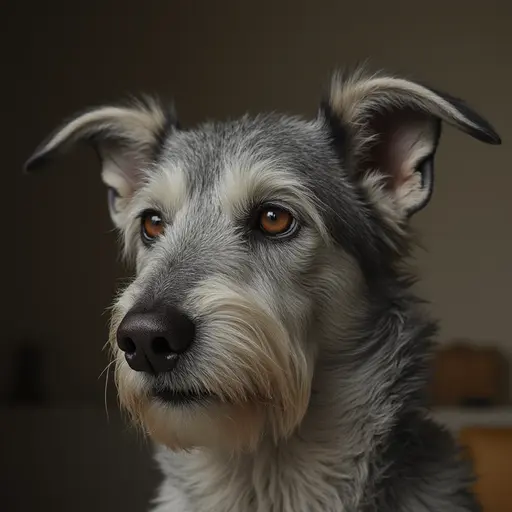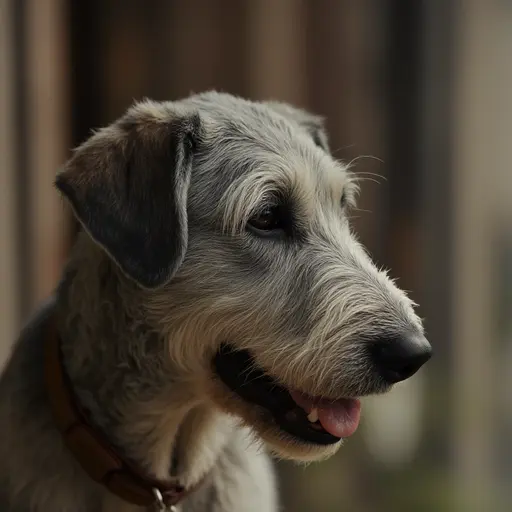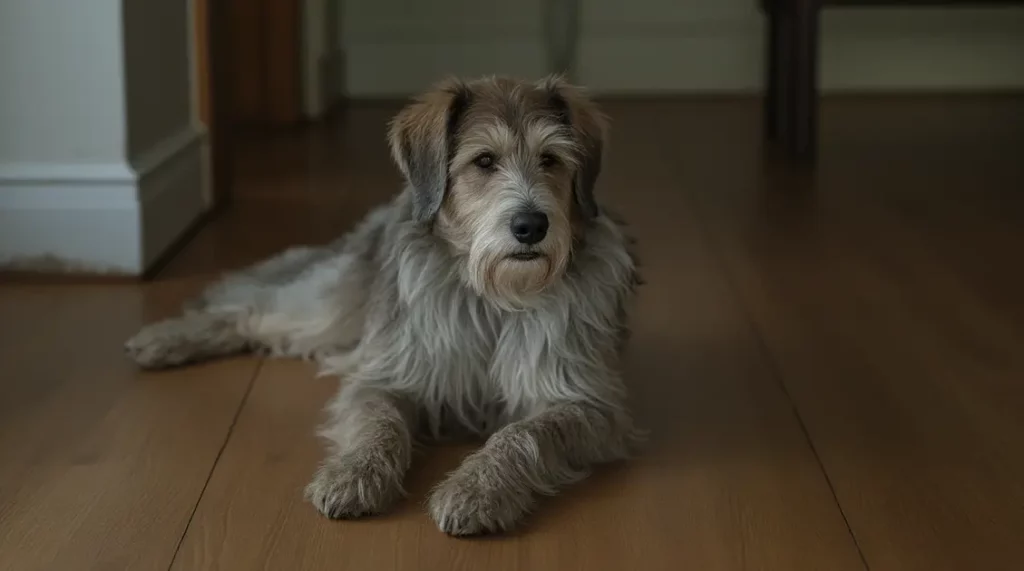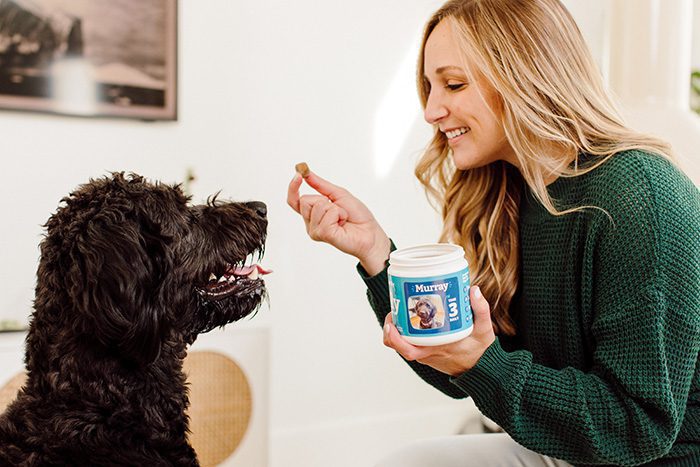Picture a dog whose silhouette once stretched across the emerald hills of ancient Ireland—a creature bred not just for strength, but for partnership. Irish Wolfhounds, with their towering frames and gentle eyes, carry a legacy woven into the fabric of Celtic history. Once trusted by chieftains and warriors, these “gentle giants” hunted wolves and elk, their loyalty as unyielding as their stature.
Yet beneath their noble past lies a modern reality: a lifespan of just 6–8 years, a fleeting heartbeat in the world of dogs. For those who welcome them into their homes, understanding their history and health becomes an act of love, a vow to honor their legacy with every cherished moment.
A Legacy Forged in Myth and Mist
Irish Wolfhounds are more than pets—they’re living artifacts. Their story begins over 2,000 years ago when Celtic clans revered them as symbols of power and prestige.
- Noble Companions to Kings: Legends claim Irish royalty gifted these hounds to foreign dignitaries, valuing them as highly as horses. Their presence in battle and hunt alike was a testament to their courage.
- Guardians Against Extinction: By the 19th century, the breed nearly vanished after wolves were eradicated in Ireland. Dedicated breeders, inspired by historical records and art, revived them, stitching their lineage back together like a forgotten tapestry.
- Modern-Day Gentle Giants: Today, they trade ancient battlefields for cozy couches, their calm demeanor belying their warrior past. Yet their size—often surpassing 30 inches at the shoulder—remains a living echo of their rugged origins.
When Time Flies: Embracing Their Brief Journey
The average dog lives 10–13 years, but for Irish Wolfhounds, 6–8 years is the norm. Their accelerated lifespan, tied to their massive size, shapes every aspect of care.
Why Every Moment Matters
Large breeds age faster, their bodies weathering the toll of rapid growth. Common health challenges like heart conditions, bone cancers, and joint issues underscore the need for vigilance. Owners often describe their time with Wolfhounds as bittersweet—a crash course in loving deeply while letting go gracefully.
- Proactive Care as a Love Language:
- Prioritize regular cardiac screenings and joint-friendly exercise.
- Opt for nutrient-dense diets to support skeletal health.
- Create memory-filled routines, from leisurely walks to lazy afternoon naps.
A Bond Beyond Time
To own a Wolfhound is to accept a pact: to fill their shorter lives with joy, stability, and purpose. Their historical role as protectors evolves into a quieter, equally vital one—teaching owners about resilience, presence, and the beauty of ephemeral connections.
In the end, Irish Wolfhounds remind us that greatness isn’t measured in years, but in impact. They bridge ancient honor with modern devotion, asking only for a lifetime of care in return for a legacy of love.

Common Health Issues in Irish Wolfhounds
Every legend has its quiet battles, and Irish Wolfhounds—despite their storied past as Celtic icons—face modern challenges that belie their majestic presence. These giants, once bred to hunt wolves, now confront invisible adversaries: genetic vulnerabilities amplified by their size and rapid growth. For owners, understanding these risks isn’t just about care—it’s about rewriting the narrative of their companion’s journey.
The Silent Threats Beneath the Surface
1. Heartbreak in Plain Sight: Dilated Cardiomyopathy (DCM)
Imagine a heart stretched thin, struggling to pump blood through a body built for endurance. Dilated cardiomyopathy, a leading cause of early mortality in the breed, weakens the heart muscle over time. Research suggests up to 30% of Irish Wolfhounds may carry genetic markers for DCM, often showing no symptoms until sudden fatigue or labored breathing arises. Regular echocardiograms and vet partnerships become lifelines, turning hope into action.
2. Osteosarcoma: The Stealthy Shadow
Bone cancer strikes with little warning, particularly in larger breeds. Osteosarcoma accounts for nearly 20% of Wolfhound deaths, often targeting limbs with aggressive growth. A slight limp or swelling might be the only clue before metastasis begins. Early detection and advances in pain management, however, offer pathways to extend quality of life—even if time remains fleeting.
3. Bloat (Gastric Torsion): A Race Against the Clock
Deep-chested anatomy, a trait honed for stamina, becomes a double-edged sword. Bloat—a sudden twisting of the stomach—can cut off blood flow in minutes. Studies note that large breeds face a 20–30% higher risk, with Wolfhounds among the most vulnerable. Preventive measures like slower feeding raised bowls, and avoiding vigorous activity after meals are not just tips—they’re lifelines.
4. Hip Dysplasia: When Size Takes Its Toll
Carrying 120+ pounds on a frame built for speed strains joints over time. Hip dysplasia, a malformation of the ball-and-socket joint, leads to arthritis and mobility loss. While genetics play a role, controlled exercise and weight management can delay its progression, preserving those joyful sprints across open fields.
The Numbers Behind the Journey
Irish Wolfhounds live 6–8 years on average—40% shorter than smaller breeds. Data reveals a sobering truth:
- Cancer claims ~35% of lives, often osteosarcoma or lymphoma.
- Cardiac issues follow closely, responsible for ~30% of deaths.
- Bloat remains a sudden, tragic threat, accounting for ~15% of fatalities.
Yet within these statistics lies resilience. Owners who prioritize twice-yearly vet screenings, tailored nutrition, and mindful exercise often report fewer emergencies and richer daily bonds.
Writing a New Legacy: Care as a Counterbalance
A Wolfhound’s health story need not be defined by fragility. Proactive steps can tilt the scales:
- Feed smart: Smaller, frequent meals to reduce bloat risk.
- Screen early: Annual cardiac ultrasounds from age 3.
- Move mindfully: Low-impact activities like swimming to spare joints.
- Love fiercely: Track subtle changes in behavior—they’re often the first warning signs.
To share your home with an Irish Wolfhound is to walk a path of courage and compassion. Their bodies, forged by history, demand vigilance—but their spirits, boundless and tender, reward it with a love that outlives even the briefest of lifetimes.
Rewriting the Future for Irish Wolfhounds
In the misty crossroads of science and devotion, a quiet revolution is unfolding for Irish Wolfhounds. Researchers, breeders, and veterinarians are collaborating to stretch the boundaries of time for these gentle giants—transforming their fleeting 6–8 years into chapters filled with vitality. From decoding ancient DNA to reimagining daily care, here’s how innovation is reshaping their story.
Decoding the Blueprint: Genetic Breakthroughs
The same genes that gave Irish Wolfhounds their legendary stature now hold clues to combating their vulnerabilities. Scientists are mapping the breed’s genome like explorers charting uncharted territory, seeking answers to centuries-old health puzzles.
- Targeting the “Silent Killers”:
- Studies at universities like Uppsala and Michigan State have identified gene variants linked to dilated cardiomyopathy (DCM), paving the way for pre-breeding screenings.
- Trials are underway for CRISPR-based therapies to edit mutations associated with osteosarcoma, aiming to disrupt cancer’s genetic roadmap before tumors form.
- Breeding Smarter, Not Harder: Ethical breeders now use polygenic risk scores—a tool that predicts disease likelihood—to pair dogs with complementary genetic strengths, slowly diluting inherited risks.
The Rise of Precision Veterinary Medicine
Gone are the days of one-size-fits-all care. Cutting-edge diagnostics and treatments are personalizing how Wolfhounds are supported through every life stage.
- Early Detection Saves Lives:
- Liquid biopsies: Blood tests that detect cancer DNA fragments before symptoms arise, offering a head start on treatment.
- Wearable tech: Collars with ECG monitors track heart rhythms in real-time, alerting owners to irregular patterns suggestive of DCM.
- Tailored Therapies:
- Immunotherapy trials for osteosarcoma, using modified canine viruses to train the immune system to attack cancer cells.
- Minimally invasive surgeries for bloat, reduced recovery time and complications by 40% in recent clinical studies.
Lifestyle as Medicine: The Power of Daily Choices
Science is proving what devoted owners have long suspected: how a Wolfhound lives profoundly shapes how long they thrives. Ongoing studies are turning anecdotes into actionable strategies.
Diet: Beyond the Bowl
Researchers at the Waltham Petcare Science Institute found that Wolfhounds fed omega-3-rich diets (think fish oil, flaxseed) showed 25% lower rates of joint inflammation. Other findings:
- Smaller, frequent meals reduce bloat risk by 60% compared to one large daily feeding.
- Hydrolyzed protein diets are under investigation for curbing gastrointestinal issues linked to shorter lifespans.
Exercise: Balancing Strength and Sustainability
A 2023 Cornell University study revealed that Wolfhounds with structured, low-impact routines (e.g., swimming, leash walks) maintained muscle mass without joint degradation. Key takeaways:
- Avoid high-impact activities before the age of 18 months to protect developing bones.
- Mental stimulation (puzzle feeders, scent work) reduces stress-related inflammation, a silent accelerator of aging.
The Horizon of Hope
While Irish Wolfhounds may never match the lifespan of smaller breeds, the gap is narrowing. A 2024 longitudinal study tracking 500 Wolfhounds reported a 12% increase in average lifespan for dogs enrolled in comprehensive care programs—proof that science and love can bend time’s arc.
For owners, this evolving landscape offers more than guidelines—it offers agency. Regular genetic testing, partnering with specialists, and embracing data-driven lifestyles are no longer optional; they’re acts of defiance against the clock, ensuring every moment with these historic hounds is as boundless as their hearts.

Weaving a Stronger Tapestry for Irish Wolfhounds
In the 19th century, as Irish Wolfhounds teetered on the edge of extinction, a handful of devoted breeders resurrected the breed using remnants of its ancient lineage. But this heroic effort came at a cost: a genetic bottleneck that still echoes in the breed’s health today. Like a tapestry rewoven with too few threads, limited gene pools left gaps—gaps now linked to heart conditions, cancers, and fragile lifespans. The challenge for modern breeders? To honor the past while stitching resilience into the future.
The Double-Edged Sword of Survival
When a breed’s survival hinges on just a few ancestors, genetic diversity dwindles. For Irish Wolfhounds, studies estimate over 60% of their modern DNA traces back to six foundational dogs from the 1800s**. This legacy creates two hurdles:
- Recessive Risks: Rare, harmful genes hide in closely related lines, increasing the chances of inherited diseases like hip dysplasia or autoimmune disorders.
- Missing Armor: Homogeneous populations lack the genetic “toolkit” to adapt to new health threats, leaving the breed vulnerable as environments change.
Yet this isn’t a death sentence—it’s a call to action.
Modern Breeding: Science Meets Stewardship
Today’s responsible breeders walk a tightrope between preserving the Wolfhound’s iconic traits and expanding its genetic resilience. Innovations are quietly rewriting the playbook:
- DNA Decoding: Affordable genetic panels now screen for 200+ mutations, allowing breeders to sidestep pairing dogs with overlapping risk genes.
- Strategic Outcrossing: A controversial but growing practice, some breeders introduce DNA from related sighthounds (like Deerhounds) to refresh gene pools—under strict oversight to retain breed identity.
- Global Collaboration: Databases like the Irish Wolfhound Health Foundation connect breeders worldwide, mapping pedigrees to avoid redundant ancestry and track longevity outcomes.
Three Pillars for Healthier Generations
For breeders committed to progress, small shifts yield profound impacts:
1. Diversify the Bloodline Mosaic
- Look beyond “champion” lines: Prioritize dogs from lesser-known kennels with robust health histories, even if they lack show titles.
- Embrace the “5-generation rule”: Avoid repeating any ancestor in a puppy’s lineage within five generations to curb inbreeding depression.
2. Test, Then Trust
- Pre-breeding health checks: Mandate cardiac ultrasounds, hip scores, and thyroid panels for both parents—not just the dam.
- Track longevity: Follow litters into adulthood, documenting causes of death to identify hidden lineage risks.
3. Educate to Elevate
- Transparent pedigrees: Share genetic test results openly with puppy buyers, fostering trust and collective awareness.
- Support “pet-quality” breeding: Not every Wolfhound needs show-ring genes. Healthy, diverse “pet line” litters strengthen the breed’s overall genetic health.
A Legacy Reimagined
The Irish Wolfhound’s story is no longer just about survival—it’s about reinvention. By treating each breeding decision as a ripple in time, modern stewards are crafting a narrative where the “gentle giant” no longer whispers tragedy. Through science, collaboration, and unwavering respect for the breed’s soul, they’re ensuring these living legends stride into the future with stronger hearts, sturdier bones, and more dawns to greet.
Tips for Owners to Promote Their Wolfhound’s Health
Owning an Irish Wolfhound is akin to tending a living monument—their grandeur demands reverence, but their fragility calls for unwavering vigilance. While their shorter lifespan can’t be rewritten, their days can be deepened with purpose and joy. Here’s how to champion their well-being, blending modern science with time-honored intuition.
1. Partner with Prevention: The Vet as Your Co-Guardian
Routine vet visits are more than checkups; they’re lifelines. These giants mask discomfort instinctively, a relic of their stoic hunting past.
- Screenings That Save:
- Cardiac ultrasounds every 12–18 months starting at age 3 to catch dilated cardiomyopathy before whispers become crises.
- Annual blood panels track liver/kidney function, as subtle shifts can signal brewing cancers.
- X-rays at maturity (around age 2) to baseline joint health, creating a roadmap for aging hips and elbows.
- Vaccines & Parasite Defense: Tailor protocols to avoid overloading their systems—ask about titer testing and heartworm preventives with minimal side effects.
2. Nourishment as Nurture: Building a Fortress from Within
A Wolfhound’s diet isn’t just fuel—it’s armor. Their rapid growth phase (birth to 18 months) sets the stage for lifelong skeletal and organ health.
- The Goldilocks Diet:
- Protein: Aim for 22–24% from high-quality sources (deboned meats, eggs) to support muscle without overloading kidneys.
- Calcium/Phosphorus Ratio: 1.2:1 to prevent developmental bone diseases—common in pups fed generic large-breed formulas.
- Slow Feeds: Use puzzle bowls or scatter feeding to curb bloat risk, turning meals into mindful rituals.
- Supplements with Purpose:
- Glucosamine + MSM from adolescence onward to lubricate joints silently bearing 100+ pounds.
- Omega-3s (krill oil over fish oil for easier absorption) dampen inflammation linked to arthritis and heart strain.
3. Movement as Medicine: Honoring Their Body’s Blueprint
Exercise for Wolfhounds isn’t about intensity—it’s about sustainability. Their bodies thrive on rhythm, not recklessness.
- Puppy Protocol:
- Avoid stairs until 12 months old to protect forming joints.
- 5 minutes of structured activity per month of age (e.g., a 4-month-old gets 20 minutes total daily).
- Adult Adjustments:
- Swim sessions: Buoyancy spares hips while building endurance.
- Leashed walks > free runs: Prevents sudden pivots that torque delicate ligaments.
- Mental workouts: Scent games or obedience drills reduce boredom-induced stress, a silent immune saboteur.
4. Decoding the Whispers: Early Warning Signs
Wolfhounds communicate in subtleties. A delayed tail wag or a half-ignored meal might be their only cry for help.
- Cardiac Red Flags:
- Sudden disinterest in walks or resting respiratory rates over 30 breaths/minute.
- Pale gums or “tucked” sleeping postures (curling tightly to ease breathing).
- Cancer Clues:
- Unexplained limping that shifts legs (osteosarcoma often metastasizes before primary tumors are found).
- Lumps smaller than a pea—in large breeds, even tiny masses warrant a biopsy.
- Bloat Alarms:
- Unproductive retching or pacing 1–3 hours post-meal.
- Distended abdomen that feels taut, like a drum.
The Art of Presence: Beyond Checklists
Ultimately, promoting a Wolfhound’s health hinges on attunement—a dance of intuition and science. Track their “normal” meticulously: the rhythm of their gait, the sheen of their coat, the cadence of their snores. Adjust as seasons change; older hounds may thrive on warmth (heated beds ease arthritic joints) and companionship (isolation accelerates decline).
In the end, your care becomes their living heritage—a testament to love that outpaces time.
Conclusion
The Irish Wolfhound’s journey—from ancient battlefield companion to modern-day hearth guardian—is a testament to resilience. Yet their fleeting lifespan reminds us that greatness often walks hand-in-hand with fragility. As stewards of these living legends, we’re tasked with balancing reverence for their history with action for their tomorrow.
The Pillars of Priority
- Heartfelt Vigilance: Dilated cardiomyopathy and cancer remain formidable foes, but early screenings and genetic awareness are turning tides. What once was inevitable is now interruptible.
- Nourished Foundations: From bone-building diets to bloat-resistant feeding rituals, every meal is a chance to fortify their towering frames against time’s wear.
- Movement with Meaning: Joints that carry centuries of legacy deserve protection—structured exercise preserves their strength without stealing their joy.
- Eyes Wide Open: Subtle shifts in behavior or appetite aren’t quirks; they’re whispers of a body speaking its truth.
A Dawn of New Possibilities
The horizon brightens with promise. Researchers are cracking genetic codes that once seemed indecipherable, while breeders weave diversity back into the breed’s tapestry. Owners, armed with knowledge and heart, are rewriting endings through:
- Science as Ally: Liquid biopsies detecting cancer in its infancy, wearable tech monitoring heart rhythms in real time—prevention is no longer passive.
- Community as Catalyst: Global networks of Wolfhound advocates share data, strategies, and hope, proving that collective care transcends borders.
- Love as Legacy: Each mindful choice—a slower walk, a vet’s visit, a carefully measured meal—becomes a brushstroke in a portrait of longevity.
Irish Wolfhounds may never rival smaller breeds in years lived, but they eclipse the most in-depth impact. Their story, once shadowed by brevity, is being rewritten through innovation and unwavering devotion. As we honor their past, we’re also architects of a future where every Wolfhound’s chapter—though still too short—is brimming with vitality, dignity, and the quiet triumph of a life fiercely cherished.
In the end, their legacy isn’t measured in timelines, but in the echoes they leave: paws etched in hearts, lessons in courage, and a blueprint for loving boldly within borrowed time.



